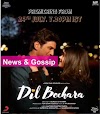After every decade, film journal Sight and Sound conducts an overall overview of film pundits to choose which movies are viewed as the best at any point made. Begun in 1952, the survey is presently generally viewed as the most significant and regarded from there.
And for a long time the key consensus was that Citizen Kane, the masterpiece created by Orton Wells, best of the best. The film topped the race for five decades from 1962 to 2002. At this point in 2012, perhaps out of Kane fatigue, Alfred Hitchcock's Vertigo left its way to the top.
That’s what the critics think. In any case, shouldn't something be said about the movie producers?
Beginning in 1992, Sight and Sound began to survey popular directors about their conclusions. Individuals like Martin Scorsese, Francis Ford Coppola, Mike Leigh and Michael Mann. So what is the best film at any point made by 358 executives surveyed in 2012? Kane? Vertigo? Maybe Jean Renoir's splendid Rules of the Game, the main film to show up in the best ten for every one of the seven critics surveys? No.
Rather, the top prize goes to Yasujiro Ozu's Tokyo Story. It's an astonishing, an illuminated, decision. Ozu's work is miles from the glimmer of Kane and the psychosexual peculiarity of Vertigo. Tokyo Story is a delicate, nuanced picture of a family whose bonds are gradually, inflexibly being frayed by the requests of modernisation. The film's passionate force is controlled and total; by the last credits you'll be overpowered both with a Buddhist feeling of the fleetingness of all things and a compelling impulse to call your mom.
But perhaps the reason filmmakers selected Tokyo Story of the various artistic show-stoppers out there is a direct result of Ozu's special way to deal with movie. Since the times of D. W. Griffith, pretty much every movie producer under the sun, even true to life rebels like Jean-Luc Godard, followed some essential shows of the structure like progression altering, the 180-degree rule and coordinating eye lines. Ozu disposed of the entirety of that. Rather, he built a profoundly particular true to life language rotating around coordinate cuts and thoroughly created shots. His film structure was radical however his accounts were widespread. That is the mystery of Ozu. You can see the trailer of the film above.
Citizen Kane does make number two on the rundown however the film is attached with another officially thorough work of art – Stanley Kubrick's 2001: A Space Odyssey. Following up is maybe the best film ever about creation a film – Federico Fellini's 8 ½. Furthermore, Ozu's film may be number one, however Francis Ford Coppola is the main producer to have two motion pictures on the rundown – The Godfather and Apocalypse Now. Also, that is no mean accomplishment.
You can see the full rundown underneath:
1. Tokyo Story - Yasujiro Ozu (1953)
2. 2001: A Space Odyssey – Stanley Kubrick (1968)
3. Citizen Kane – Orson Welles (1941)
4. 8 ½ - Federico Fellini (1963)
5. Taxi Driver – Martin Scorsese (1976)
6. Apocalypse Now – Francis Ford Coppola (1979)
7. The Godfather – Francis Ford Coppola (1972)
8. Vertigo – Alfred Hitchcock (1958)
9. Mirror – Andrei Tarkovsky (1974)
10. Bicycle Thieves – Vittorio De Sica (1949)
Read this also: Tom Cruise to shoot in space with Elon Musk’s SpaceX









0 Comments